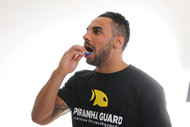Best mouthguards to protect teeth
Mouth guards are covers that you put over your teeth to protect them from getting hurt from grinding your teeth or playing sports. Mouth guards Come in a variety of styles to protect your teeth.
Type of Mouth Guards
Mouth guards are divided into three categories:
Stock mouth protectors
Stock mouthguards have been tested and are ready to use. They are reasonably priced and are available at most sporting goods and department stores.
However, they are bulky, make breathing and talking difficult, and provide little or no protection, and there is little that can be done to adjust their fit. Dentists advise against using them.
Boil and bite mouth protectors
Many sporting goods stores sell boil and bite mouth protectors, which may provide a better fit than stock mouth protectors. The thermoplastic material was used to construct the boil and bite mouth guard. After softening in hot water, it is placed in the mouth and shaped around the teeth with finger and tongue pressure.
Custom-fitted mouth protectors
Individually designed mouth protectors are made in a dental office or a professional laboratory according to your dentist's instructions. Your dentist will take an impression of your teeth and then use a special material to mold a mouthguard over the model.
This custom-made mouth guard is more expensive than the other types due to the special material used and the additional time and work required, but it provides the most comfort and protection.
Mouth guards usually only cover your upper teeth, but your dentist may also make one for your lower teeth (for example, if you have braces or another fixed dental appliance on your lower jaw).
Your dentist can advise you on which mouth guard is best for you. A good mouth guard should be comfortable, tear-resistant, durable, easy to clean, and not interfere with your breathing or speech.
If you grind your teeth at night, a nocturnal bite plate or bite splint, a type of mouth guard, may be made to prevent tooth damage.
What type of mouthguard is the most effective at protecting your teeth?
Because they are made to fit the unique shape of your upper teeth, custom mouth guards provide the most protection.
Custom mouth guards are the most expensive, but they provide a level of protection for your smile that cannot be matched by generic stock or boil and bite mouth guards found in sporting goods stores.
Remember that the cost of restoring a damaged tooth is much higher than the cost of a custom mouth guard.
Your dentist will make a mouth guard for your child's lower teeth if they have braces or another fixed dental appliance. Braces mouth guards protect you from broken wires and brackets.
The Bottom Line
A mouth guard can provide protection and help you get a good night's sleep, whether you're playing sports or have a sleep disorder.
Consult your dentist if you're still unsure about which type of mouthguard you require. They can either help you design a custom mouth guard or suggest an over-the-counter option. At Instasmile we offer clip-on veneerswhich can be a great alternative to a mouthguard for those struggling with teeth grinding.
Frequently Asked Questions
Who Needs a Mouth Guard in the First Place?
Mouth guards should be worn by children and adults who participate in contact sports like football, boxing, soccer, ice hockey, basketball, lacrosse, and field hockey.
Even those participating in non-contact sports (such as gymnastics) and recreational activities (such as skateboarding and mountain biking) that could result in a mouth injury would benefit from wearing a protective mouth guard.
A nocturnal bite plate or bite splint should be made for adults and children who grind their teeth at night to prevent tooth damage.
When playing sports, why should you wear a mouthguard?
Because accidents can happen during any physical activity, wearing a mouthguard while participating in sports can help reduce the risk of mouth-related injuries to your lips, tongue, and soft tissues. Mouth guards can also protect you from chipped or broken teeth, tooth nerve damage, and tooth loss.
How do I keep my mouth guard in good shape?
Follow these steps to maintain your mouth guard:
- Before and after each use, rinse your mouth guard with cold water or a mouth rinse, or clean it with mild soap and a toothbrush.
- After you clean the mouth guard with cool, soapy water, rinse it well.
- Place the mouth guard in a firm, perforated container to store or transport the mouth guard. This helps to prevent damage by allowing air to circulate. Keep the mouth guard in fresh, clean water if it is acrylic.
- To avoid distorting the shape of the mouth guard, keep it away from extreme temperatures like hot water, hot surfaces, or direct sunlight.
- Examine the mouth guard regularly for signs of wear and tear. Replace it if it has holes or tears or becomes loose or uncomfortable.
- Bring your mouth guard to your regular dental appointments to have it examined by your dentist.
I'm looking for a mouth guard. Where can I get one?
Only a dental professional can provide you with a custom-fit mouth guard. Stock or boil-and-bite mouth guards can be purchased online, as well as in drugstores and sporting goods stores.
How long does it take a mouth guard to wear out?
A custom-fitted mouth guard can last several years with proper care, depending on how frequently you use it and how much wear and tear it receives. Some people, however, may need to replace their mouth guards more frequently.
Bring your mouth guard to your dental appointments so your dentist can check it for cracks or other signs of wear.
Mouth guards purchased over the counter aren't as long-lasting. Every few months, you might need to replace them. As children's teeth and mouths develop, they may need to replace mouth guards more frequently.

 UK
UK
 USA
USA
 Australia
Australia

